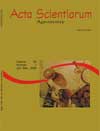<b>Potential of <em>Ocimum gratissimum</em> medicinal plant on <em>Bipolaris sorokiniana</em> control in the wheat seeds</b> - DOI: 10.4025/actasciagron.v28i2.1071
Abstract
The in vitro effect of Ocimum gratissimum medicinal plant CE (autoclaved and sterilized by filtration) as well as the iprodione+thiram fungicide on the mycelial growth and sporulation of B. sorokiniana was evaluated. Besides, wheat seeds naturally infected with B. sorokiniana were submitted to the following treatments: 1) fumigation with essential oil; 2) immersion with autoclaved CE and; 3) non autoclaved CE at different concentrations (1, 5, 10, 15, 20, 25, and 50%; m/v); 4) sprinkling with dry leaves of the medicinal plant and with the fungicide. The autoclaved CE showed, even partially, higher inhibition of mycelial growth in all the tested concentrations (1, 5, 10, 15, 20 and 50%, m/v) than CE sterilized by filtration. In greenhouse, the fumigated seeds (7 days) showed the same emergency speed (EV) concerning to the control (water). There were no statistics differences among the analysed parameters (EV, emergency percent, height, dry mass, fresh mass, and transmission rate (TR)) when the treatment by immersion was compared with the no treated check. Seeds treated with the dry powder of medicinal leaves did not differ statistically from the chemical control, when the same parameters were evaluated, but presented higher TR of the pathogen. In the laboratory, seeds submitted to the fumigation process presented a higher number of health seeds than the non treated control, while the treatments by immersion in the CE and sprinkling with dry leaves did not differ concerning to the same parameter.Downloads
Download data is not yet available.
Published
2008-03-13
How to Cite
Rodrigues, Érica dos A., Schwan-Estrada, K. R. F., Stangarlin, J. R., Scapim, C. A., & Fiori-Tutida, A. C. G. (2008). <b>Potential of <em>Ocimum gratissimum</em> medicinal plant on <em>Bipolaris sorokiniana</em> control in the wheat seeds</b> - DOI: 10.4025/actasciagron.v28i2.1071. Acta Scientiarum. Agronomy, 28(2), 213-220. https://doi.org/10.4025/actasciagron.v28i2.1071
Issue
Section
Crop Protection
DECLARATION OF ORIGINALITY AND COPYRIGHTS
I Declare that current article is original and has not been submitted for publication, in part or in whole, to any other national or international journal.
The copyrights belong exclusively to the authors. Published content is licensed under Creative Commons Attribution 4.0 (CC BY 4.0) guidelines, which allows sharing (copy and distribution of the material in any medium or format) and adaptation (remix, transform, and build upon the material) for any purpose, even commercially, under the terms of attribution.
2.0
2019CiteScore
60th percentile
Powered by 

2.0
2019CiteScore
60th percentile
Powered by 



















































